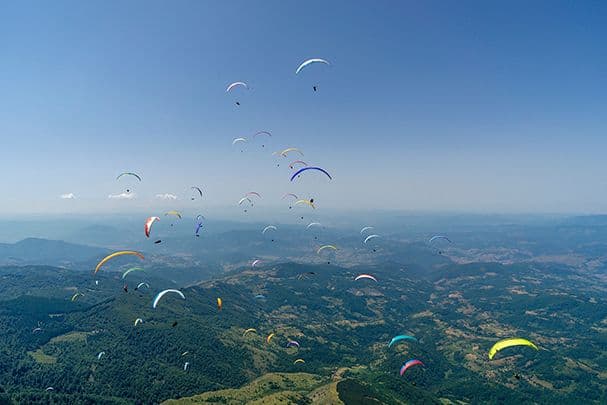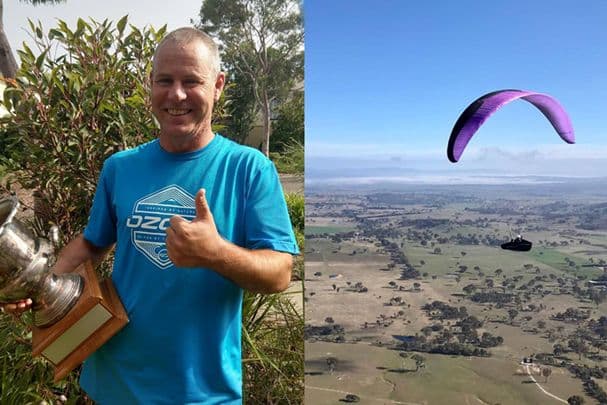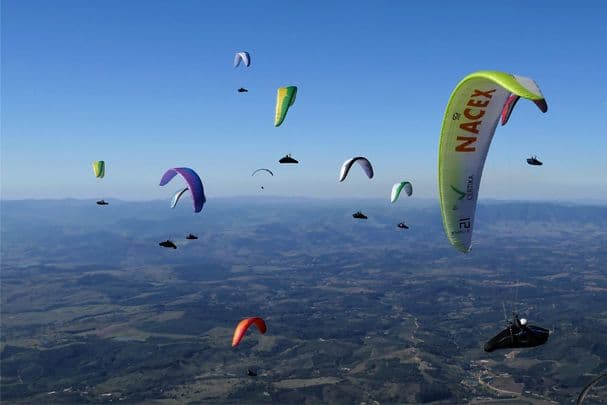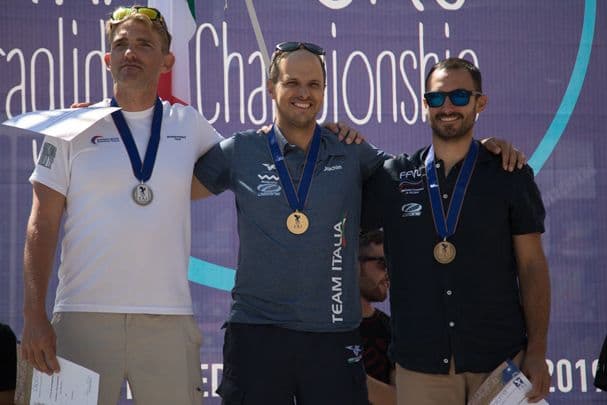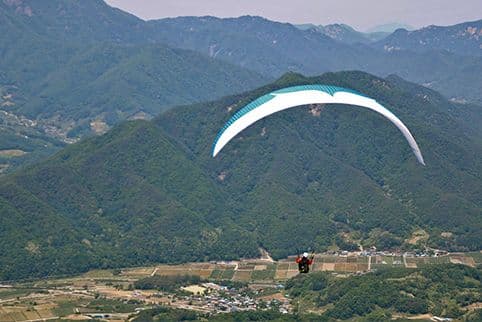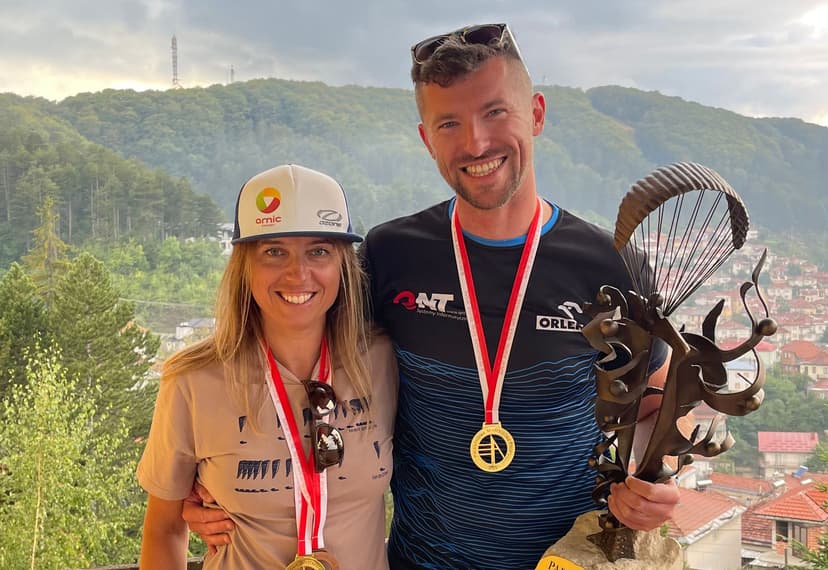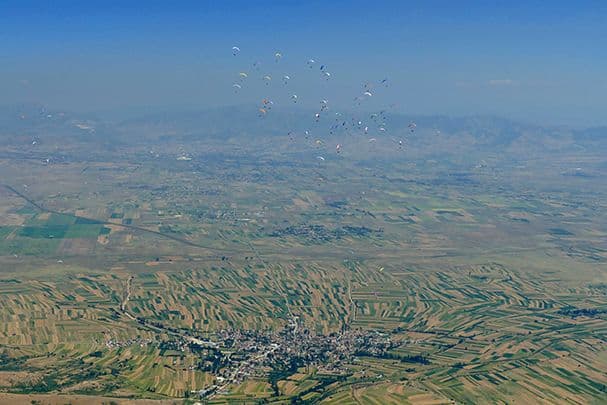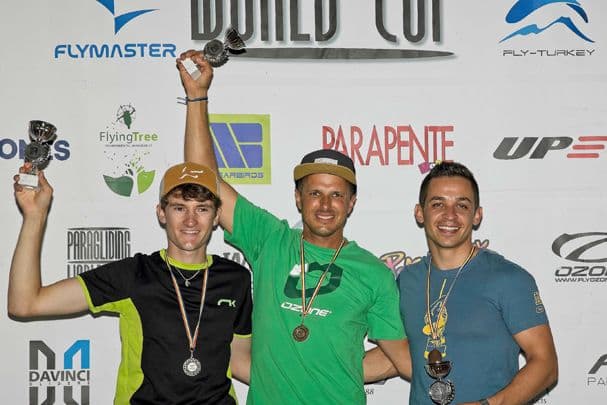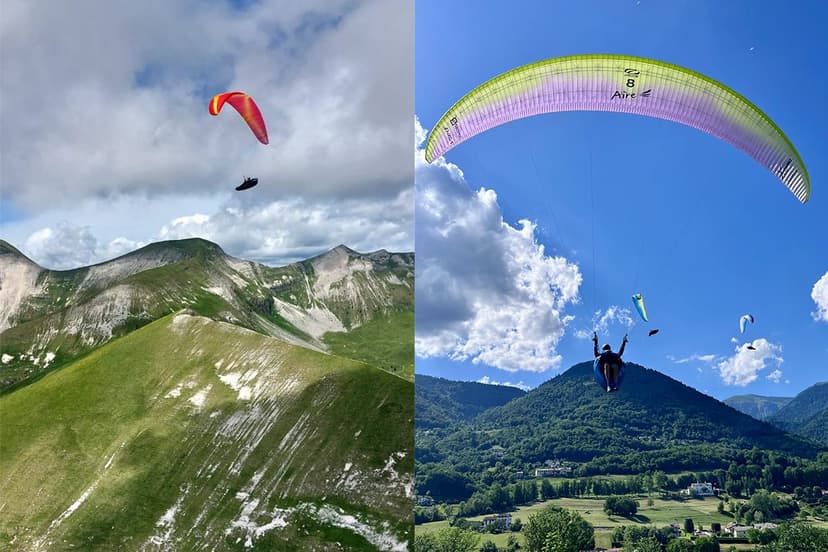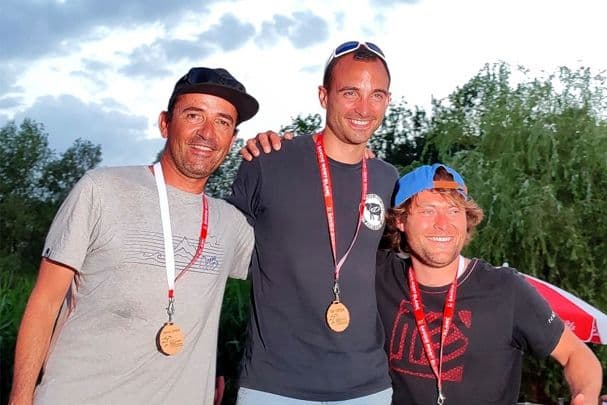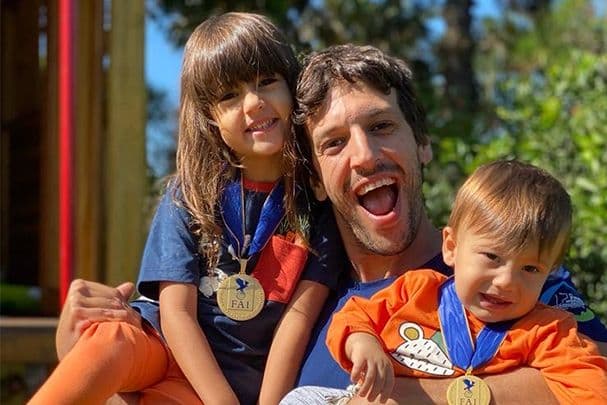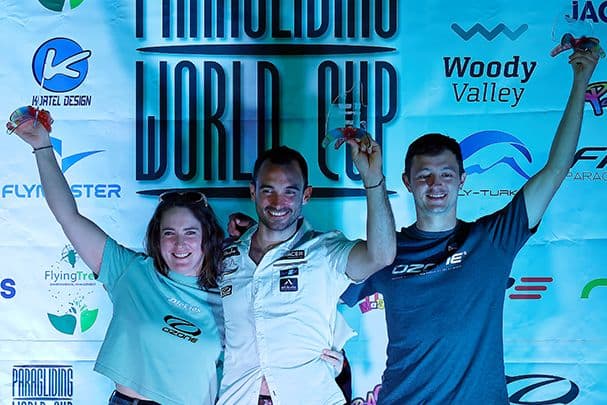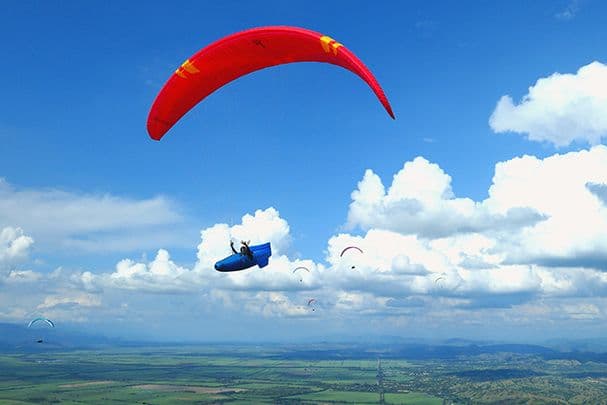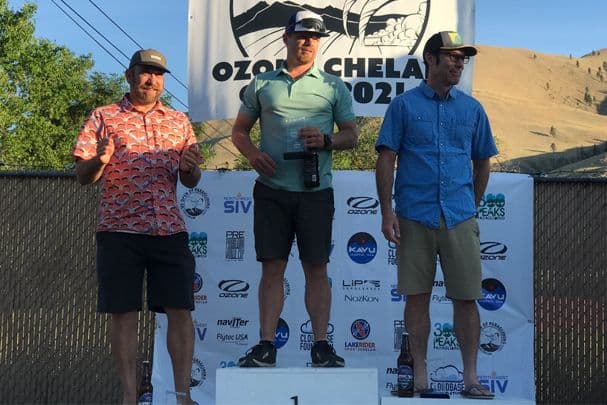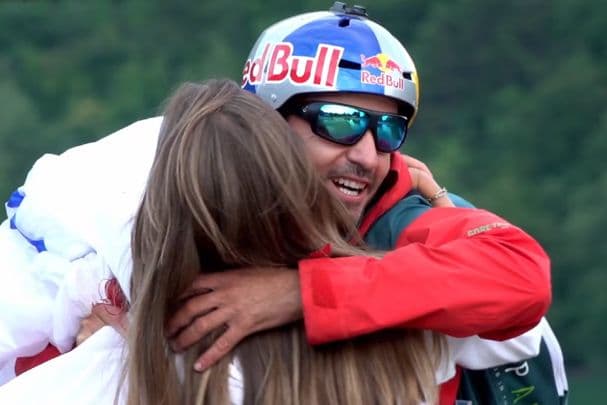

BECOMING EUROPEAN CHAMPION
Published on:
02 Aug 2018
The 15th FAI European PG Championship in Montalegre, Portugal came to an end on Saturday, after eight valid tasks. It was a hotly contested competition flown in challenging conditions until the last day.
A 19 year old British pilot named Theo Warden (Enzo 3), took first overall, and is the new European Champ. He was joined on the podium by Torsten Siegel (GER) and Alberto Vitale (ITA, Enzo 3).
In the women’s category, it was Ozone Team pilot, Seiko Fukuoka, representing France, who won her third consecutive European title. Meryl Delferriere (FRA) Yael Margelisch (SUI) took second and third, also flying the Enzo 3.
The Spanish team took first for the nations category for the first time, with Italy in second and France in third.
Behind the results there is always a story… a story about what it takes to win. This is the story of Theo Warden, 19 years old, on the road to become European Champion:
“The funny thing is that to some people 5 years doesn’t feel like a lot of time, but to me, over the course of the last 5 years I feel like so much has changed - starting off in the Airways Airsports tow field as a 14-year-old with average school grades and questionable prospects, to taking part in a Category 1 comp like the 2018 European Championship and winning. I feel like paragliding has given me the opportunity to mature and grow in ways I previously thought weren’t possible.
My flying style is nothing new. I have always been rather conservative in my flying, not taking too much risk, and this idea was reinforced when I joined the BPRA (British Paragliding Racing Academy). Russ Ogden and Guy Anderson swear by a disciplined way of flying where you take little risk and roll with the first gaggle unless an opportunity presents itself to get a lead on everyone. The fewer decisions you make, the better.
In most competitions before the Euros I went in with a certain idea of which position I would like to rank at. This would give me a target and I would push to get that target. However, although this may work for some, I ended up putting too much pressure on myself and I would end up flying in situations I wouldn’t usually put myself in if I had just kept a level head and thought things through. A good example of this would be the Ecuador PWC, a short comp with only 3 taskable days. In the first 2 tasks I came 10th and 7th, and on the last day I had this expectation that I should finish within the top 10: I pushed too hard, landed out and came in 91st. This was a real learning curve for me because I realised that if I flew for the results I would perform worse, and I wasn’t enjoying the tasks as much as I used to. From that point on I threw my ego and expectations out the window and focused on flying for fun.
Flying with fun as the only objective is not new but it became apparent to me that it really can work for me at the PWC Superfinal in Colombia in January this year where I managed 15th place overall, my best competition result at that point. Everything really seemed to come together in the Europeans because I could see my name in at the top of the overalls at the end of a few days and it wouldn’t phase me. I knew that if I wanted to do well I just had to carry on having fun, roll with the lead gaggle and stay disciplined. This allowed me to stay calm and think about the flying.
In the last couple of competitions I’ve been ill for some reason, and it seems to have some magical power to make me fly better. I’m not sure what got me in the Euros, whether it was dodgy food or water, but on the 23rd of July it felt like everything inside me wanted to get out. Valentina Correia, a member of the organising team (and an absolute lifesaver) found me lying on the floor outside the toilets in HQ and she asked me if I was okay. I told her what was going on and she immediately sorted me out. Jess Cox volunteered to accompany me to the hospital to get checked out even though the buses had been due to set off half an hour later to go up the mountain. We waited for a while in the hospital at which point the weather looked to be improving, so Valentina helped translate my problems to the doctor and then kindly drove Jess up the mountain whilst the doctor attended to me. After about an hour hooked up to an IV line the doctors let me go and Valentina was there to help me and drive me up the hill. Luckily for me, after everything that happened in the morning the task ended up being cancelled due to strong wind, which gave me a chance to rest up in bed with the team popping in my room to see if I was okay. Andrew Williams went and bought me some fruit and other things to get my strength back up.
A special thank you to Idris Birch, Jess Cox, Andrew Williams, Malin Lobb, Martin Long and Jules Robinson for being the best team, even if we didn’t win the team championships. And a super special thank you Valentina Correia for just being an amazing person and helping me out when I needed it.
I really believe the team played a vital role in the way I felt and flew during the competition. Everyone was there to help and support one another. Each day before breakfast either Jess or Malin would lead us in a session of yoga and or meditation. As a teen so I’m used to feeling tired in the mornings but I found yoga to be really helpful! And by the end of the 2 weeks almost all of us could touch our toes.
When it came to the tasks, although I had my best task results on task 2 and 3 I felt like they were my least favourite, as I felt a little rusty as a result of not flying much since the Superfinal six months earlier. But once I got into the swing of things I felt a lot more confident in my decision making. It really started to click around half way through the comp with a day where Idris, Malin and I fell behind at the start. We caught the lead gaggle by taking a better line right under the middle of some convergence on full bar. Man, just watching them get closer and closer whilst your going flat out and also going up … what a feeling!
My favourite task had to be the last task because it was make or break. I knew I had to not let Torsten Siegel get 14 points on me and that I had a chance to have a podium finish. When everything was this close, that’s when it got interesting.
I had a reasonable place in the start but as we all set off down the course I chose a terrible line between the 2 main gaggles which just murdered me and put me right underneath everyone. After that point it was a game of catch up. I pushed on from turnpoint 1 across some ridges, and at this point I was low. I looked back and could see people landing in the valley behind me. I saw Martin in the next valley, so I got on the radio to see if he was climbing … no response. So with few other options I pushed on low to try and get to where I thought Martin was climbing. I arrived with little height above ground, found he was climbing and took a few turns. Then I noticed the lead gaggle pushing over the top of me to the next valley. At this point I knew it was either catch up now or be left behind for the rest of the race. So I left Martin’s climb to join an orange glider which seemed to have scraped himself up off the valley floor and was now climbing. The orange glider and I converged, and then together we searched around and found some stronger lift which the lead gaggle seemed to have missed. We were around 100 metres below the leaders when they left their climb but our climb had been stronger, and some other pilots had come and joined beneath us in the thermal. I was watching where the leaders were and watched someone go off course line slightly but get lift the whole way as the leaders fell out of the sky … So full bar through the lift and within 5 minutes I was back alongside Idris and the leaders.
The cumulus seemed to stop as we got to turnpoint 3. Marco Busetta pushed on into the Chaves Valley but most of the gaggle stayed on the edge to get as much height as possible before gliding into the blue. Out of nowhere Marco Busetta started skyrocketing in the valley: at this point I was at the top of the gaggle and decided to try push on a bit early to join up with him in the thermal. I started gliding with Torsten tailing me as we glided. We got the climb and the gaggle joined us and we flew on towards the Chaves plateau.
Up to that point I felt like I was flying rather well, but that’s when we started some long glides which is where I started to drop below the gaggle. Slowing down to try and match them on glide didn’t help, so I ended up lower and at the back. At this point I could feel myself tensing up and getting stressed. But then I thought as long as I don’t bomb out I will probably come within the top ten, so I should just chill out. I managed to catch up just before the gaggle’s last climb, and with the leaders above me, I put them out of my head and just tried to reduce the gap by climbing faster than them. In the end I closed the gap a little but they must have hit the inversion and started gliding with me still 400m below.
This is the bit that makes me laugh. The lead gaggle were already on full bar and Idris came on over the radio shouting “GO THEO, IT’S LIFTY” so I just went for it. I left the thermal needing around 13 to 1 to glide to goal. A few seconds later I watched everyone in front of me go into some strong sink … Great! With nothing else to do I tucked my arms inside my harness and made the area presented to the air as small as possible. With still 2km before I got to the ESS I knew I wasn’t going to make it. I had 350 meters above the ground with around 5km to goal. So, when I hit a 2.5 m/s thermal I realised I needed to gain more height. I was left behind by the gaggle as I took a minute or so to do 4 more turns to end up at 500 meters AGL with still 4.8 km to goal. Back on bar, my heart has never been beating so fast in a task. I started seeing people coming off bar. And after what felt like an age, “Ding” from my instruments notified me I had reached end of speed. I came off bar but I still needed 7 to 1 glide to make it to the goal, and for the first 800 metres of the glide to goal I didn’t see above 7 once on my vario. The feeling of desperation got worse when I watched 2 gliders turning back into wind and landing about 500 metres from the goal cylinder. Then my vario started beeping … f*ck, I’m going up ... With the lift being a bit patchy and around 1 km to goal I decided to ride the lift without turning. I was watching the glide to goal get less and less, then “Ding, Ding”. What a feeling!! I might have been late but man, it felt good to arrive in goal, even if I only had 60 metres of height to spare.
In the goal field no one knew where we stood. I got a call from my dad. He was sat at at his laptop with a spreadsheet open trying to figure out where I might be placed in the final overalls (He also said well done!) He told me that there was a good chance I would be on the podium, but failing that, then certainly in the top 10. After that I put it out of my mind and went for a swim in the lake next to the goal field with the Brits that made it. It wasn’t until we were on the bus home that the organisation sent out the provisional results, and Malin, Jules and Jess shouted “Well done !! You’ve done it” from the back of the bus. I didn’t believe them so checked for myself and there it was -- 2 points ahead of Torsten, and I was in first place.
But there was only 2 points in it. I realised afterwards that such a small margin equates to a difference of less than 10 seconds on a task of 2½ hours. That would have been the difference taking a fifth turn in the last thermal before final glide ... and I think if I had only taken 3 turns I might not have made goal and dropped out of the top 10. What a comp!"




